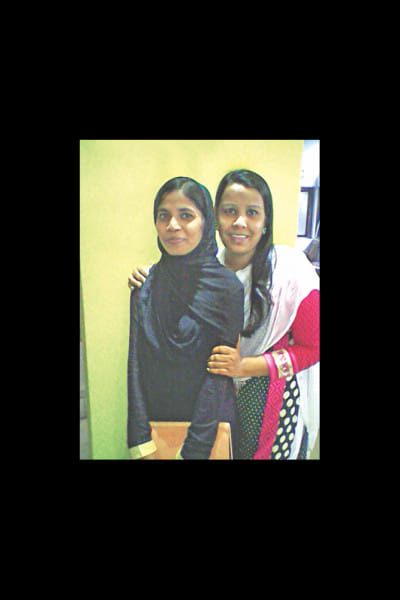The indomitables

A garment employee, Aklima Akhter shoulders the responsibility for her family from whom she was taken away by traffickers when she was just seven.
As she got reunited with her old parents and siblings eight years ago, she decided to support them.
"I financed marriages of two of my younger sisters. The youngest one, who is visually challenged, lives with me at Savar. My parents and younger brother live in Khulna [her home district]. I am thinking of bringing them to Savar soon," said the 24-year-old who works at a garments factory in Savar EPZ.
In a patriarchal society like this, girl children are mostly considered a burden that their families like to shed as early as possible by marrying them off. The fate of those who have fallen victim to rape, violence, trafficking and forced marriage is even worse. They rot to their tiniest existence even without engendering any sympathy towards them.
Aklima is among those who are proving the stereotype wrong. She lost her childhood at the hands of the traffickers. All she could recall was that she had been playing on the shore of a river when she was doped up and bundled into a vehicle and that her father was a peon of Khulna judge court.
The police later rescued her along with 13 other children and sent them to the central jail in Dhaka.
After she lived there for two years, Bangladesh National Women Lawyers' Association took her to their shelter home in Agargaon when she was nine.
There her life took a new turn. She got access to education for the first time. Besides institutional education, she gained communication and computer skills.
Her eyes twinkle as she describes her days in the shelter -- studying and participating in extra- curricular activities like dancing and acting -- growing up as a confident human being.
After she passed class-VIII, she met her mother through the help of another inmate of the shelter, who was also from Khulna and found her family back.
Aklima was 16 then and could not recognise the woman, who had given birth to her, right away. With time, she not only accepted her family but also chose to work, rather than continuing her study, to take care of them.
She also helps others in whatever way possible.
Rina and Jhumur, two other young women from the shelter, now live with Aklima who arranged jobs for them at the factory where she works.
"I have struggled to get myself where I am now and I feel I have responsibility to help others find opportunity in society.”
Like Aklima, Ayesha Akhter (not her real name) fought social injustice throughout her childhood and now is the only support to her mother since her father died.
Herself a victim of early marriage at the age of 10, the degree student of a college in Rajshahi's Bagmara has been campaigning against child marriage.
"I tell people in my village about the ills of such practices,” said the 20-year-old, and tries her level best to deter parents from marrying their daughters off at early age.
Ayesha was falsely accused of a relationship with a man her grandfather's age in 2005 and village arbitrators subjected her to lashing and forced marriage with that man.
When the news came to the media, the police intervened and rescued her. A case was filed against the man and the village arbitrators.
During the case proceedings, the lawyers' association helped her get admission into Bharateswari Homes, a reputed boarding school for girls in the country. From there she passed her Secondary School Certificate exams.
She then went back to her family and sat Higher School Certificate exams from a local college. After the death of her father, she took a part-time job at the human resource department of a garment unit to bear her educational expenses and care for her mother.
Ayesha and her mother are living in the same village. The villagers have realised their mistake.
“They don't taunt me, rather the man who almost married me lives in shame now," she said, adding that he as well as the arbitrators had served their terms in jail.
Since 2000, the lawyers' association has given shelter to 4,564 girls and helped 4,091 get reintegrated into the mainstream, said Salma Ali, executive director of the NGO that works for women's rights.
Society should give girls like Aklima or Ayesha a chance, a platform so that they can build their life, instead of ostracising them for the crime they did not commit.
“These girls are no longer victims. They have come out as rebels, fighters through their struggle,” said Salma Ali.

 For all latest news, follow The Daily Star's Google News channel.
For all latest news, follow The Daily Star's Google News channel. 



Comments